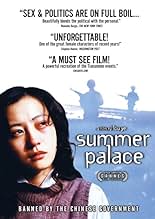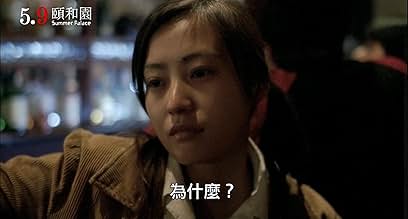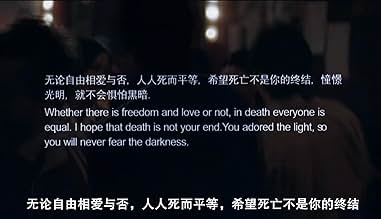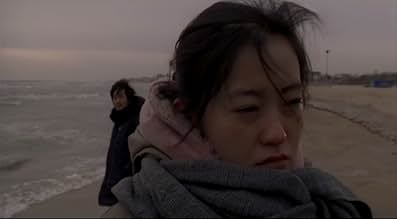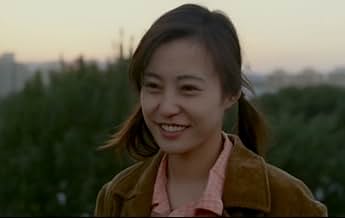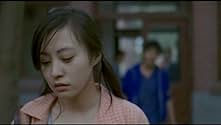IMDb RATING
7.2/10
4.8K
YOUR RATING
Yu Hong leaves her home village and starts university in Beijing, where she develops a consuming and compulsive relationship with another student. The student riots from 1989 then ensue and ... Read allYu Hong leaves her home village and starts university in Beijing, where she develops a consuming and compulsive relationship with another student. The student riots from 1989 then ensue and take a toll on their lives.Yu Hong leaves her home village and starts university in Beijing, where she develops a consuming and compulsive relationship with another student. The student riots from 1989 then ensue and take a toll on their lives.
- Awards
- 1 nomination total
- Director
- Writers
- All cast & crew
- Production, box office & more at IMDbPro
Featured reviews
I thought this film was a fascinating portrait of Chinese youth and culture, as they struggle through some astoundingly turbulent times. Coming into maturity while defining love, commitment, and one's self is a challenging part of any youth's life, but all the more so as part of a society that is struggling through the same challenges itself. I found interesting analogies of the Chinese village in the character of Yu Huong, and the big city in Zhou Wei. Somewhere around college age, we all attempt to define what is important to us and explore what we can do, can be, and want. Some of that experience is sorting through our history - family, village, cultural - and deciding what we want to carry forward and embrace, and what to rebel against and discard, and I believe that this film paints a lovely, if gritty, portrayal of modern China doing just that. In their dorm rooms, in the bars and restaurants, in their homes, in their hearts. On the one hand, I would have, aesthetically, enjoyed a more sumptuous, smooth production; but that is not modern China. China (what admittedly little of it I've seen) is gritty, sweaty, crowded, noisy, straining, and that's what I see in this film.
Having watched the movie myself and reading some of the comments/reviews with regards to the movie prompted me to post something in fairness to the movie.
I feel that the movie was meant to let audience have a feeling that the leads in the movies are lost. If we were to think of the backdrop of the movie, set in the late 80's, Tiananmen incident, the chant for democracy, all this would have let you understand that the China then was not a China that many could understand.
The China up till the 80s was probably such a controlled and suppressed place to live in, and when these suppressed feelings and emotions were suddenly set free, it was like an explosion. The literature and external factors began influencing the way the people viewed and did things. This could explain the "mindless" love making scenes as the desires to love and to have sex were probably something that was not openly displayed or demonstrated. Freedom is what everyone wants, but the maturity to handle the consequence of the actions brought about by freedom might not be something that everyone can handle.
The movie also explores on people who dare not love. All because they fear losing it. I personally felt the characterization was done quite well, and was aptly shown by the character Yu Hong. Love is not something that can be explained logically or defined in any one way. The insight to the characters views and actions in this movie shows that clearly.
Summer Palace is a movie worth watching, but it might not be a movie that is for everyone. Keep an open mind and try and understand the time and country this movie is set in, you'd probably appreciate the movie much better that way.
I feel that the movie was meant to let audience have a feeling that the leads in the movies are lost. If we were to think of the backdrop of the movie, set in the late 80's, Tiananmen incident, the chant for democracy, all this would have let you understand that the China then was not a China that many could understand.
The China up till the 80s was probably such a controlled and suppressed place to live in, and when these suppressed feelings and emotions were suddenly set free, it was like an explosion. The literature and external factors began influencing the way the people viewed and did things. This could explain the "mindless" love making scenes as the desires to love and to have sex were probably something that was not openly displayed or demonstrated. Freedom is what everyone wants, but the maturity to handle the consequence of the actions brought about by freedom might not be something that everyone can handle.
The movie also explores on people who dare not love. All because they fear losing it. I personally felt the characterization was done quite well, and was aptly shown by the character Yu Hong. Love is not something that can be explained logically or defined in any one way. The insight to the characters views and actions in this movie shows that clearly.
Summer Palace is a movie worth watching, but it might not be a movie that is for everyone. Keep an open mind and try and understand the time and country this movie is set in, you'd probably appreciate the movie much better that way.
This film is about several Chinese people, about how they grow up and how time changes them. It is focused on one couple, the very intense passion that they feel for each other and the paths that life shows them in relation of what they feel in each step of their lives...
This movie is centered in love. More exactly, it is centered in the romantic view of life, which is destined to collide with the fact of growing up, because the characters in the film just can't manage to keep their passionate feelings while they start living other things after leaving university. It is as if life and circumstances pushes them to leave behind their memories, the anchor that seems to keep the characters living and knowing that they are someone. I think it is interesting how this is managed as the film goes by, because I recognized this feeling in myself and among my friends: about how, by leaving school, you have the feeling to be adrift in the universe of life.
Also, the passion that the characters feel becomes sedated by the tedium of their lives after school. I think the director tries to communicate that feeling: after university, the characters start to get bored with their lives, compared with what they lived in school. It is sad to look how the woman character struggles to keep that feeling alive, but always feeling depressed because she can't grasp that passion that just goes away. They travel, they meet other people, they get jobs, but simply it's not the same. This is also related to the student's protests in China, all the feelings and expectations they generate, and the disillusion they found when they have to confront the real world.
Finally, I think what the film communicates, is that every emotion, love, feeling or whatsoever, is seized by time. This is something that the characters just don't get and the reason of why they suffer: they can't accept that they are different from the ones that were young and passionate. Even in long marriages, couples have to reinvent themselves to keep together each other, or simply they fall in the arms of custom. This last thing is what the characters refuse to do, always trying to keep their feelings alive. But that's also the reason of why they suffer, especially the woman character: they live attached to their memories and they leave part of their identity in the past. I think that a phrase that is showed in the french movie "Irreversible" could fit perfectly on this one: TIME DESTROYS EVERYTHING. But in this film, this phrase applies in a more subtle way, in something that involves people's identities.
I liked the movie. It was one of those which you can't get out of your head for the rest of the day. The acting is good and the music is great. If there is something to criticize, is that the film is a little bit too long for what it express, specially at the second part of the film. I found other criticism unfounded: sex is an important part of the film, since it express passion, and it's definitely NOT a soap opera, because it doesn't have a happy ending and it has a message that you have to discover by thinking and feeling the film.
I recommend this one.
This movie is centered in love. More exactly, it is centered in the romantic view of life, which is destined to collide with the fact of growing up, because the characters in the film just can't manage to keep their passionate feelings while they start living other things after leaving university. It is as if life and circumstances pushes them to leave behind their memories, the anchor that seems to keep the characters living and knowing that they are someone. I think it is interesting how this is managed as the film goes by, because I recognized this feeling in myself and among my friends: about how, by leaving school, you have the feeling to be adrift in the universe of life.
Also, the passion that the characters feel becomes sedated by the tedium of their lives after school. I think the director tries to communicate that feeling: after university, the characters start to get bored with their lives, compared with what they lived in school. It is sad to look how the woman character struggles to keep that feeling alive, but always feeling depressed because she can't grasp that passion that just goes away. They travel, they meet other people, they get jobs, but simply it's not the same. This is also related to the student's protests in China, all the feelings and expectations they generate, and the disillusion they found when they have to confront the real world.
Finally, I think what the film communicates, is that every emotion, love, feeling or whatsoever, is seized by time. This is something that the characters just don't get and the reason of why they suffer: they can't accept that they are different from the ones that were young and passionate. Even in long marriages, couples have to reinvent themselves to keep together each other, or simply they fall in the arms of custom. This last thing is what the characters refuse to do, always trying to keep their feelings alive. But that's also the reason of why they suffer, especially the woman character: they live attached to their memories and they leave part of their identity in the past. I think that a phrase that is showed in the french movie "Irreversible" could fit perfectly on this one: TIME DESTROYS EVERYTHING. But in this film, this phrase applies in a more subtle way, in something that involves people's identities.
I liked the movie. It was one of those which you can't get out of your head for the rest of the day. The acting is good and the music is great. If there is something to criticize, is that the film is a little bit too long for what it express, specially at the second part of the film. I found other criticism unfounded: sex is an important part of the film, since it express passion, and it's definitely NOT a soap opera, because it doesn't have a happy ending and it has a message that you have to discover by thinking and feeling the film.
I recommend this one.
This film caught me from the moment it started at my screen. we see a young girl encountering her first experiences with love and sex.set at the decor of the huge changes China is undergoing in the mid-eighties.She is excepted at university and meets a handsome guy she's so overpowering in love with , it's scary...wow , the acting , directing ,editing, photography...is breathtaking..the story sometimes heartbreaking..trough sidesteps we are witnessing the student uproar at tianamen square etc.the 2 main characters loose sight of each other and we follow moments of their separate lives.. A breathtaking lovestory about love so strong , it hurts. definitely worth watching.
Lou Ye's "Summer Palace" ("Yihe yuan") has plenty of frontal nudity and a fair number of (not very attractive) sex scenes, but that's not why the movie was banned by Beijing, and Ye forbidden to work in the film industry for five years.
More likely, official displeasure was incurred by the film's powerful recreation of the Tiananmen events of 1989, from the students' point of view - and, coincidentally, equaling Tolstoy's representation of the chaos of war in the Borodino scenes of "War and Peace." And yet, all that is besides the point.
Rather, after tonight's screening of "Summer Palace" in the Castro, at the 25th annual San Francisco International Asian American Film Festival, your bewildered and overwhelmed reporter is positing this central question: whither Lou Ye? After those five years (or making movies elsewhere) will Ye become the new Zhang Yimou and China's best or just an imitator of the loathsome Tsai Ming-liang, teasing and torturing the audience... just because he can?
My money - and hope - is on the better scenario. However strange and convoluted and bizarre and frustrating "Summer Palace" may be, it appears "sincere" and not reaching for effect. It's a magnificent failure or a miserable masterpiece, a stupid soap opera or a splendid insight into the human condition - the choice is up to you; for me, it was all that, and more. Seen so far only at film festivals (Cannes, Toronto, Mill Valley, Pusan and Oslo), the film is due for release in France next month and not, so far, in the U.S.
Lack of commercial exposure may not be a bad thing. This is a "festival film," if there was ever one, and watching it on DVD may be the next best thing. If it came to theaters in this country, few people would go to see it, and of those, many would leave long before its conclusion 2 hours and 20 minutes later. And yet, and yet...
The script - also by Ye, apparently heavily autobiographical - follows a group of young people from their Beijing University days in the 1980s through the present. The central character is Yu Hong, a teenager from the countryside. As played by Lei Hao - with little of Zhang Ziyi's physical charms and a hundred times her acting ability - here is a cinematic heroine for the ages: a complex, puzzling, neurotic young woman with touching aspirations and scary unpredictability. Lei Hao becomes the character in a naked, unselfconscious, totally believable way - she alone make "Summer Palace" a must-see film (except that you can't).
Ye's way of telling the story is personal, iconoclastic, dragging here, speeding up there, taking us to Berlin (?!), unintentionally nonlinear, showing Yu Hong is similar situations time and again - and yet slowly spinning an intelligent, poetic subtext in the background.
Hard as it may be to imagine, "Summer Palace" has something in common with Alain Resnais' "Last Year in Marienbad," in its wistfulness, lack of specific believability and yet presenting a feeling that makes perfect "sense." There are a hundred things "wrong" with Ye's work and yet it's one of the more memorable films in years.
More likely, official displeasure was incurred by the film's powerful recreation of the Tiananmen events of 1989, from the students' point of view - and, coincidentally, equaling Tolstoy's representation of the chaos of war in the Borodino scenes of "War and Peace." And yet, all that is besides the point.
Rather, after tonight's screening of "Summer Palace" in the Castro, at the 25th annual San Francisco International Asian American Film Festival, your bewildered and overwhelmed reporter is positing this central question: whither Lou Ye? After those five years (or making movies elsewhere) will Ye become the new Zhang Yimou and China's best or just an imitator of the loathsome Tsai Ming-liang, teasing and torturing the audience... just because he can?
My money - and hope - is on the better scenario. However strange and convoluted and bizarre and frustrating "Summer Palace" may be, it appears "sincere" and not reaching for effect. It's a magnificent failure or a miserable masterpiece, a stupid soap opera or a splendid insight into the human condition - the choice is up to you; for me, it was all that, and more. Seen so far only at film festivals (Cannes, Toronto, Mill Valley, Pusan and Oslo), the film is due for release in France next month and not, so far, in the U.S.
Lack of commercial exposure may not be a bad thing. This is a "festival film," if there was ever one, and watching it on DVD may be the next best thing. If it came to theaters in this country, few people would go to see it, and of those, many would leave long before its conclusion 2 hours and 20 minutes later. And yet, and yet...
The script - also by Ye, apparently heavily autobiographical - follows a group of young people from their Beijing University days in the 1980s through the present. The central character is Yu Hong, a teenager from the countryside. As played by Lei Hao - with little of Zhang Ziyi's physical charms and a hundred times her acting ability - here is a cinematic heroine for the ages: a complex, puzzling, neurotic young woman with touching aspirations and scary unpredictability. Lei Hao becomes the character in a naked, unselfconscious, totally believable way - she alone make "Summer Palace" a must-see film (except that you can't).
Ye's way of telling the story is personal, iconoclastic, dragging here, speeding up there, taking us to Berlin (?!), unintentionally nonlinear, showing Yu Hong is similar situations time and again - and yet slowly spinning an intelligent, poetic subtext in the background.
Hard as it may be to imagine, "Summer Palace" has something in common with Alain Resnais' "Last Year in Marienbad," in its wistfulness, lack of specific believability and yet presenting a feeling that makes perfect "sense." There are a hundred things "wrong" with Ye's work and yet it's one of the more memorable films in years.
Did you know
- TriviaIn September of 2006, director Lou Ye was barred from making movies for five years because the film incorporated footage of the Tiananmen Square demonstrations and wasn't approved by Chinese officials. The Chinese government also demanded that all copies of the film be confiscated.
- GoofsThere were no nightclubs or bars in 1980's Beijing such as the ones portrayed in Summer Palace. Despite the presence of a few underground bars in Beijing at that time, it is highly improbably that any university students would patron such establishments. Moreover, those bars did not play American pop music, did not allow dancing, did not stock western liquor, and certainly did not admit foreigners. Any clubs or bars like the ones shown in Summer Palace did not begin appearing in Beijing until the late 1990s and did not gain popularity amongst middle-class college students until after the new millennium.
- ConnectionsFeatures Les Quatre Cents Coups (1959)
- SoundtracksIn Yeon
Performed by Ha Dong-jin
- How long is Summer Palace?Powered by Alexa
Details
- Release date
- Countries of origin
- Official sites
- Languages
- Also known as
- Summer Palace
- Filming locations
- Production companies
- See more company credits at IMDbPro
Box office
- Budget
- $2,500,000 (estimated)
- Gross US & Canada
- $63,045
- Opening weekend US & Canada
- $8,717
- Jan 20, 2008
- Gross worldwide
- $143,027
- Runtime
- 2h 38m(158 min)
- Color
- Aspect ratio
- 1.85 : 1
Contribute to this page
Suggest an edit or add missing content


